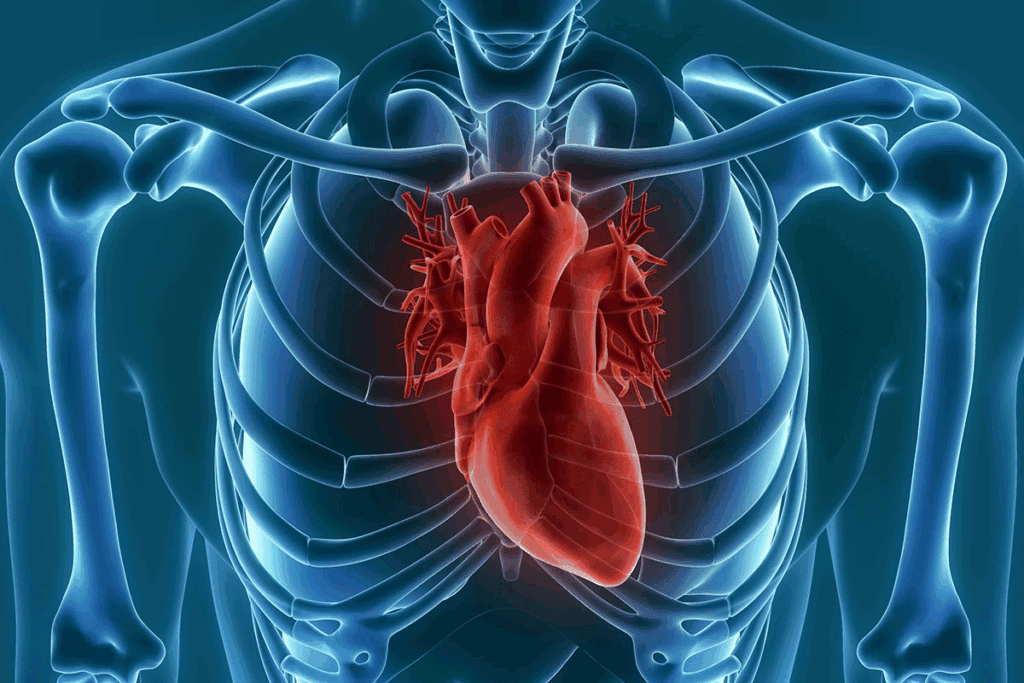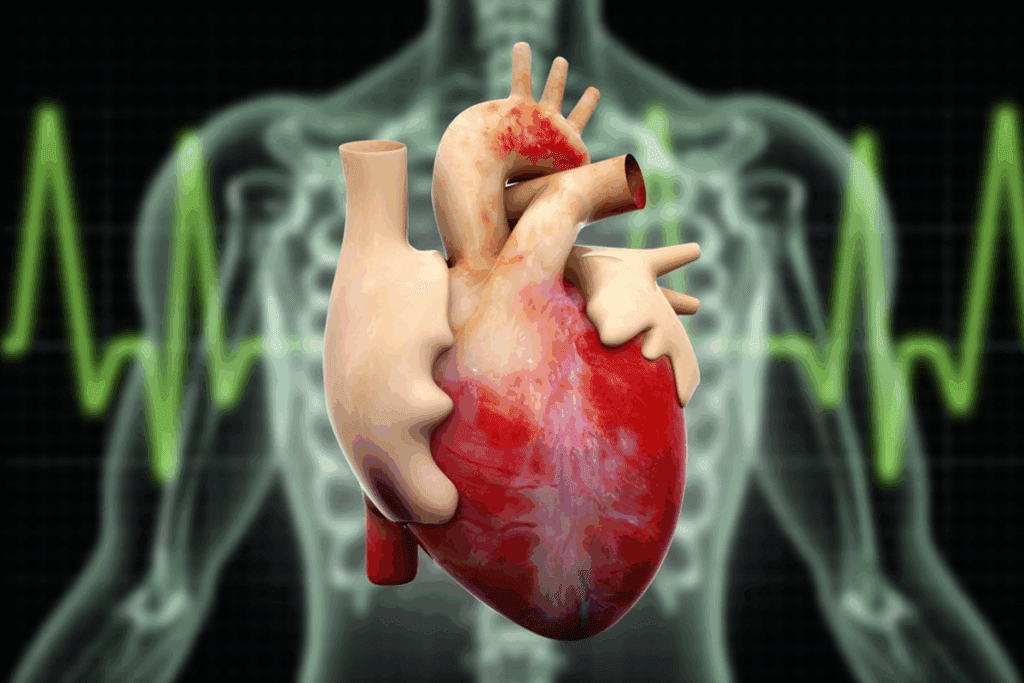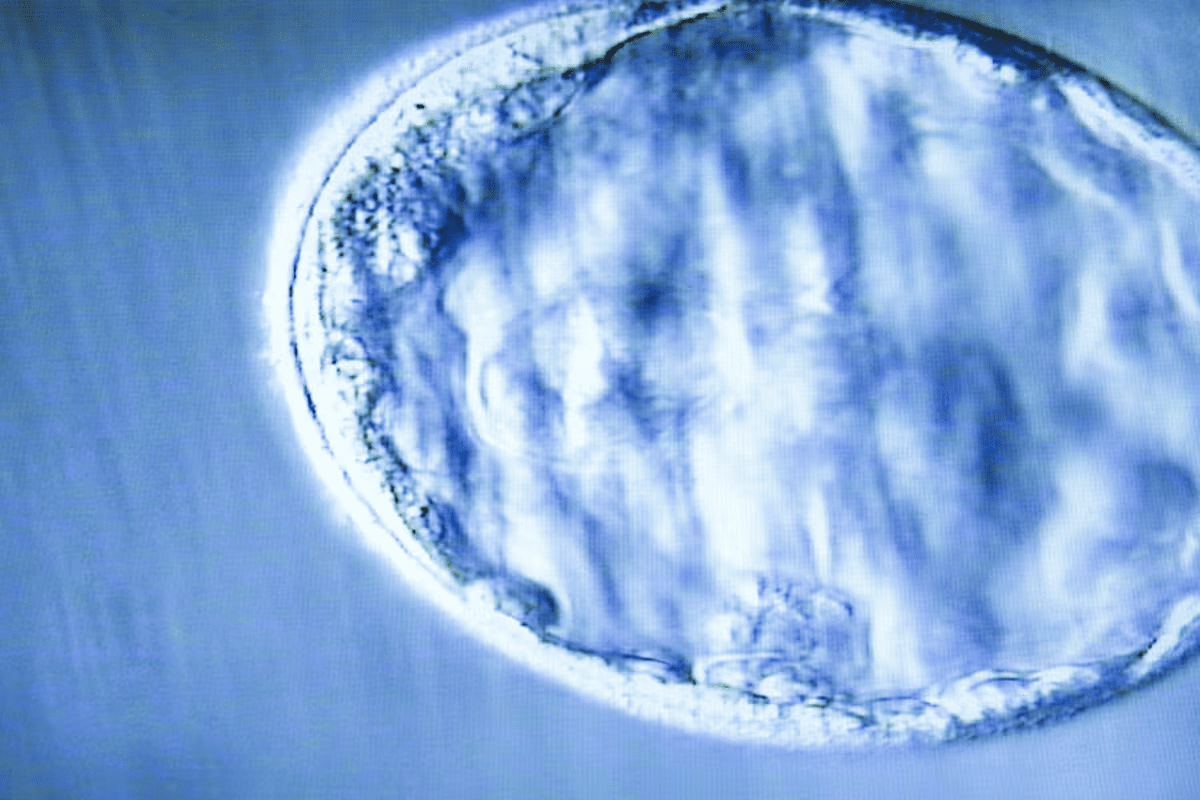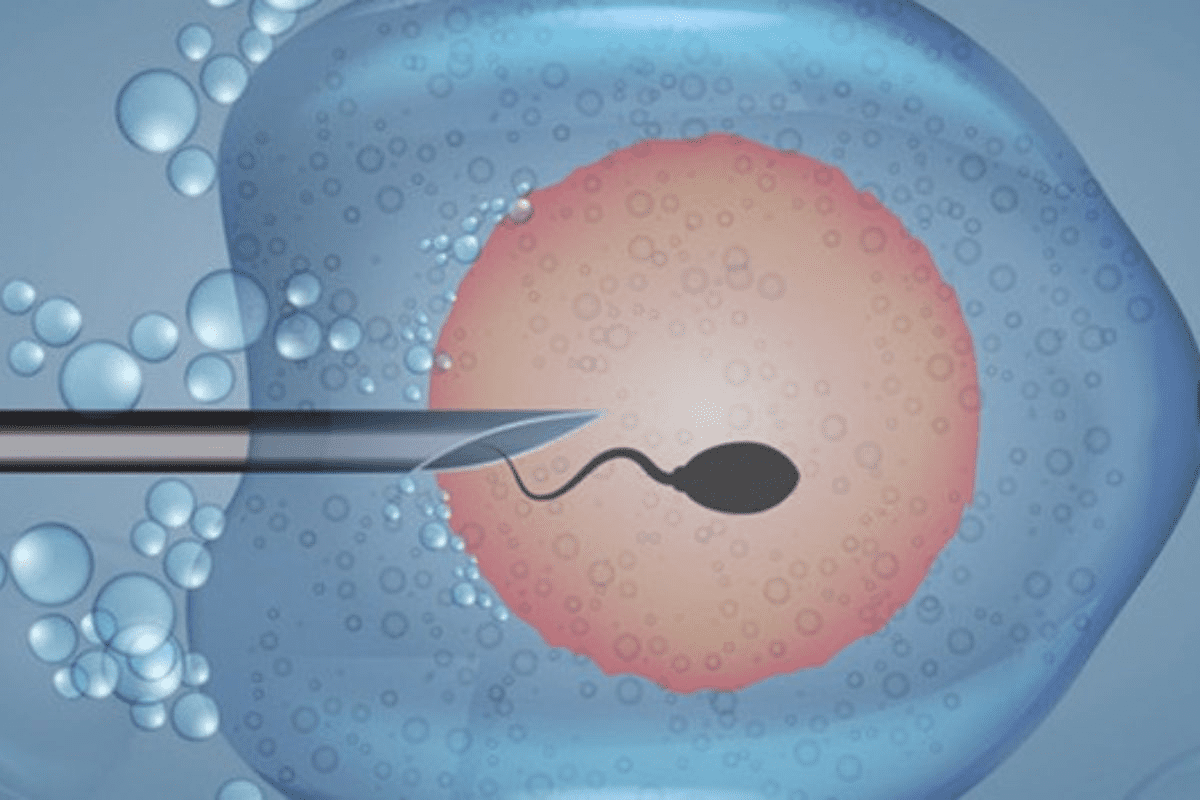
Congenital heart failure is a serious heart condition that people are born with. It happens because of heart defects that make it hard for the heart to pump blood well. At Liv Hospital, we know how important it is to treat this condition and give our patients the best care.
Congenital heart disease means there’s a problem with the heart’s structure from birth. These issues happen when the heart or blood vessels don’t form right in the womb. Our team is dedicated to helping patients and their families understand this condition and its effects.
Learn what congenital heart failure means, its symptoms, and adult outcomes.
Key Takeaways
- Congenital heart failure is a serious condition that affects the heart’s ability to pump blood.
- It is present from birth and results from structural defects in the heart.
- Understanding the meaning and symptoms of congenital heart failure is key for managing it well.
- At Liv Hospital, we offer complete care for patients with congenital heart failure.
- Our team is committed to helping patients and families make informed health decisions.
Understanding Congenital Heart Failure

To understand congenital heart failure, we need to know its medical terms and how it differs from other heart failures. It involves problems with the heart’s structures, like arteries, valves, and chambers.
Definition and Medical Terminology
Congenital heart failure means the heart can’t pump enough blood for the body’s needs. This is because of a problem present at birth. The term “congenital” means it’s there from the start, unlike heart failure that comes later.
Medical terms like “cyanotic” and “acyanotic” are used to describe congenital heart failure. They tell us if the condition causes blue skin due to poor blood oxygen. Knowing these terms helps doctors diagnose and treat the condition well.
How It Differs from Acquired Heart Failure
Congenital heart failure is different from acquired heart failure. Acquired heart failure comes from things like high blood pressure or diabetes. Congenital heart failure needs early treatment, often surgery, to fix the problem.
Acquired heart failure can be managed with lifestyle changes and medicine. But congenital heart failure needs a specific treatment plan because of its unique nature. This shows why accurate diagnosis and treatment are key.
The Impact on Blood Circulation
Congenital heart failure affects blood circulation, causing symptoms like tiredness and shortness of breath. It also leads to swelling in the legs and feet. The heart’s poor pumping can cause fluid to build up in the body.
This problem with blood circulation makes it hard for the body to get oxygen and nutrients. It can affect growth and development in children. Knowing how congenital heart failure affects circulation is important for managing it and improving life quality.
The Underlying Causes of Congenital Heart Failure

The causes of congenital heart failure are many. They include heart defects, genetics, and what the mother is exposed to during pregnancy. Knowing these causes helps doctors diagnose and treat the condition better.
Common Structural Heart Defects
Heart defects are a main reason for congenital heart failure. These defects can affect the heart’s walls, valves, and blood vessels. This can lead to abnormal blood flow and strain on the heart.
Septal defects, for example, let blood flow between heart chambers. This can lead to inefficient blood oxygenation and more work for the heart. Valve malformations can block or let blood flow back, putting more strain on the heart.
Genetic Factors and Inheritance Patterns
Genetics are a big part of congenital heart failure. Some genetic syndromes, like Down syndrome, increase heart defect risk. Family patterns also show a genetic link, but the exact genes can differ.
Knowing the genetic causes helps identify at-risk individuals. It can guide prenatal testing and counseling.
Environmental Risk Factors During Pregnancy
What the mother is exposed to during pregnancy can also affect the baby’s heart. Diabetes, obesity, and certain toxins or medications in the mother increase heart defect risk.
Keeping a healthy lifestyle during pregnancy is key. This includes eating well and avoiding harmful substances. It helps lower the risk of congenital heart failure and other birth defects.
It’s important to watch for congenital heart failure symptoms early. Look for signs like trouble breathing, poor feeding, or blue skin in newborns. As kids get older, watch for fatigue, shortness of breath, or slow weight gain.
Types of Congenital Heart Defects Leading to Heart Failure
Congenital heart disease includes many structural problems that can make the heart work poorly. These issues can affect the septum, valves, and blood vessels. If not treated, they can cause heart failure.
Septal Defects (Holes in the Heart)
Septal defects are holes in the septum, the wall between heart chambers. These holes can let blood flow between sides, making circulation less efficient. This can make the heart work too hard, leading to heart failure if not fixed.
Valve Malformations
Valve malformations are problems with the heart’s valves. Stenotic valves are too narrow, and regurgitant valves leak. Both types make it hard for blood to flow right, forcing the heart to work harder. This can lead to heart failure.
Abnormal Blood Vessel Connections
Abnormal blood vessel connections can mess up normal blood flow. For example, patent ductus arteriosus is when a fetal connection doesn’t close after birth. This can cause too much blood to go to the lungs, leading to heart failure.
Complex Congenital Heart Defects
Complex congenital heart defects have many problems at once. Tetralogy of Fallot and transposition of the great arteries are examples. These need surgery to fix and can harm the heart’s function, leading to heart failure.
Recognizing Congenital Heart Failure Symptoms in Infants
It’s important to know the signs of congenital heart failure in babies. These symptoms can show up in different ways. So, it’s key for parents and caregivers to watch for early signs.
Early Warning Signs in Newborns
Newborns with congenital heart failure might show symptoms right after birth. These can include:
- Difficulty breathing or rapid breathing
- Pale or blue-tinged skin (cyanosis)
- Poor feeding or difficulty feeding
- Excessive sweating
- Failure to gain weight at a normal rate
Feeding Difficulties and Growth Problems
Infants with congenital heart failure often have trouble feeding. This is because their heart can’t pump blood well. This can cause:
- Tiring easily during feeding
- Not consuming enough calories
- Poor weight gain or failure to thrive
Watching how they eat and grow is important. These can show if there’s a heart problem.
Respiratory Distress and Cyanosis
Signs like respiratory distress and cyanosis need quick medical help. These can show as:
- Rapid or labored breathing
- Wheezing or grunting sounds while breathing
- Blue discoloration of the skin, lips, or fingernails
| Symptom | Description | Action Required |
| Difficulty Breathing | Rapid or labored breathing | Seek immediate medical attention |
| Cyanosis | Blue discoloration of skin, lips, or fingernails | Immediate medical evaluation |
| Feeding Difficulties | Tiring during feeding, poor weight gain | Consult a pediatrician for guidance |
Spotting and acting on these symptoms early is key. If you see any, get help from a doctor right away.
Signs and Symptoms in Children and Adolescents
It’s key to know the signs of congenital heart failure in kids and teens. Their symptoms can change as they grow. This means we need to keep watching them and adjust their care plans.
Physical Activity Limitations
Kids with congenital heart failure might find it hard to play. They might get tired easily or have trouble keeping up. Some might even feel short of breath or have heart palpitations when they’re active.
Parents and caregivers should watch these kids closely. They should work with doctors to find safe ways for them to exercise. A study in the Journal of Pediatrics showed that kids with heart disease can get better with the right exercise plan.
| Symptom | Description | Impact on Child |
| Easy Fatigue | Tiring quickly during activities | Limits playtime and social interaction |
| Shortness of Breath | Difficulty breathing during exertion | Restricts participation in physical activities |
| Palpitations | Awareness of irregular heartbeats | Can cause discomfort and anxiety |
Developmental Concerns
Congenital heart failure can slow down a child’s growth. We work with families to watch these kids closely. We help them in any way we can.
“Children with congenital heart disease are at risk for developmental delays, making early intervention critical for their best outcomes.” – Medical Expert, Pediatric Cardiologist
Early help and care can really improve a child’s life. A team of doctors and experts can spot any growth delays early. This way, we can help them catch up.
Progressive Symptom Changes
As kids with congenital heart failure get older, their symptoms can change. Some might get worse, while others might get better. We stress the need for regular check-ups to keep an eye on these changes.
By understanding and meeting the changing needs of kids and teens with congenital heart failure, we can give them the best care. This helps them stay healthy and happy.
Congenital Heart Failure in Adults
Congenital heart disease can affect adults, even if they didn’t know they had it. Thanks to better medical care, more people with heart defects are living into adulthood. This brings new challenges in managing their health.
Late-Presenting Congenital Heart Defects
Some heart defects aren’t found until adulthood. This is because they might not show symptoms early on. Early detection is key for getting the right treatment.
Adult-Specific Symptoms and Complications
Adults with heart failure might feel short of breath, tired, or have swollen legs. They could also face heart rhythm problems, valve issues, and a higher risk of infections. Regular check-ups with a cardiologist are important to manage these issues.
Impact on Quality of Life
Heart failure can really affect an adult’s life. It can make it hard to work, exercise, or feel well overall. Making lifestyle changes and getting support can help manage the condition and improve life quality.
Pregnancy Considerations for Women with CHF
Pregnancy is riskier for women with heart failure. They need careful planning and monitoring. A team of doctors is essential to keep both mom and baby safe.
Diagnosis and Assessment Methods
Diagnosing congenital heart failure needs a detailed plan. This includes a physical check-up, a full medical history, and advanced tests. Our goal is to give patients the right care by accurately diagnosing and assessing their condition.
Physical Examination and Medical History
A detailed physical check is key in spotting congenital heart failure. We look for signs like cyanosis, clubbing of the fingers, and abnormal heart sounds. A thorough medical history helps us understand the patient’s risk factors and symptoms.
During the check-up, we examine the patient’s overall health. We look for signs of heart failure, such as edema, fatigue, and shortness of breath. The medical history gives us insights into the patient’s symptoms, family history, and past heart conditions or surgeries.
Imaging Techniques
Imaging is essential in diagnosing congenital heart failure. We use different imaging methods to see the heart’s structure and function.
- Echocardiography: This non-invasive test uses sound waves to create images of the heart, allowing us to assess its structure and function.
- Cardiac MRI: Magnetic Resonance Imaging provides detailed images of the heart, helping us evaluate its anatomy and function.
- Chest X-ray: This test helps us assess the heart’s size and shape, as well as the condition of the lungs.
Laboratory Tests and Cardiac Catheterization
Laboratory tests and cardiac catheterization give us more information needed for diagnosing and assessing congenital heart failure.
| Test | Purpose |
| Blood Tests | To check for signs of heart failure, such as elevated BNP levels, and to assess overall health. |
| Electrocardiogram (ECG) | To evaluate the heart’s electrical activity and detect any abnormalities. |
| Cardiac Catheterization | To assess the heart’s chambers and blood vessels, and to measure pressures within the heart. |
By combining the results of these tests, we can accurately diagnose congenital heart failure. This helps us create a treatment plan that meets the patient’s specific needs.
Treatment Approaches for Congenital Heart Failure
Treating congenital heart failure needs a mix of medical and surgical steps. Each patient gets a plan that fits their needs. This helps improve heart function and quality of life.
Surgical Interventions
Surgery is key to fix or replace damaged heart parts. These surgeries can greatly boost heart function and lessen heart failure symptoms. Some common surgeries include:
- Repair or replace heart valves
- Closure of septal defects
- Correction of abnormal blood vessel connections
Surgical outcomes have gotten better over time. This is due to new surgical methods and better care after surgery.
Medication Management
Medicines are vital in managing symptoms and slowing heart failure. Some common ones are:
| Medication Type | Purpose | Examples |
| ACE Inhibitors | Reduce blood pressure and strain on the heart | Lisinopril, Enalapril |
| Beta-Blockers | Slow heart rate and reduce blood pressure | Metoprolol, Carvedilol |
| Diuretics | Remove excess fluid from the body | Furosemide, Spironolactone |
Choosing the right medicines is very personal. Patients might need a mix of drugs to manage their heart failure well.
Catheter-Based Procedures
Catheter-based procedures are a less invasive option for some. They can:
- Close holes in the heart
- Repair or replace valves
- Improve blood flow through the heart and vessels
Heart Transplantation Considerations
For severe heart failure, a heart transplant might be an option. This involves swapping the sick heart with a healthy one. It’s a big surgery but can give a second chance at life.
Choosing a heart transplant depends on many things. These include the patient’s health, how bad their heart failure is, and more.
Living with Congenital Heart Failure
For those with congenital heart failure, daily life is filled with careful choices to stay healthy. It’s about more than just medical treatment. It’s about making lifestyle changes and getting ongoing support.
Lifestyle Modifications
Healthy lifestyle choices are key to managing congenital heart failure. This means:
- Dietary Changes: Eating foods that are good for your heart, like fruits, veggies, whole grains, and lean proteins.
- Regular Exercise: Doing physical activities that your doctor says are safe for you.
- Smoking Cessation: Stopping smoking to protect your heart from more damage.
- Limiting Alcohol Consumption: Not drinking too much alcohol to avoid putting extra stress on your heart.
Long-term Monitoring and Follow-up Care
Keeping up with regular check-ups and tests is vital for managing congenital heart failure. This includes:
- Regular Check-ups: Seeing your doctor often to keep an eye on your health.
- Diagnostic Tests: Getting tests like echocardiograms and electrocardiograms to check how well your heart is working.
- Medication Management: Taking your medicines as directed to help manage symptoms and slow the disease.
Psychological and Social Support
Dealing with congenital heart failure can affect your emotions and social life. It’s important to have a strong support system that includes:
- Family and Friends: Having people who understand and support you.
- Support Groups: Connecting with others who face similar challenges.
- Mental Health Professionals: Getting help from mental health experts when you need it.
By taking a holistic approach to managing congenital heart failure, you can enhance your quality of life and outcomes.
Recent Advances in Congenital Heart Failure Research
Recent years have brought big changes in congenital heart failure research. This offers new hope for those affected. We’re seeing big steps forward in managing and treating this condition, thanks to new research and tech.
Emerging Treatment Technologies
New treatment technologies are exciting in congenital heart failure research. We have advanced surgical methods and 3D printing for heart models. VADs are also getting better, helping more kids and adults with heart failure.
Catheter-based treatments are becoming common too. They allow for less invasive fixes for heart defects. These advancements help patients right away and improve their long-term health.
Genetic Testing and Personalized Medicine
Genetic testing is changing how we treat congenital heart failure. We can now find specific genetic causes of heart defects. This lets us use personalized medicine to tailor treatments to each person.
Genetic counseling is also key. It helps families understand the risks of heart defects. This info is vital for planning and early action.
Improving Long-term Outcomes
The main goal of research is to improve long-term results for patients. We’re making great strides, with more people living into adulthood. Research aims to manage long-term issues like arrhythmias and heart failure.
We’re creating detailed care plans for long-term health. This includes regular check-ups, lifestyle advice, and timely treatments. A whole-person approach improves life quality for those with congenital heart failure.
Conclusion
Congenital heart failure is a complex condition that needs careful care and management. We’ve looked at its meaning, symptoms, and effects. We also talked about the different treatments and the need for ongoing support.
At Liv Hospital, we aim to give top-notch healthcare. We use a team approach and follow the latest care paths. Our team works hard to give the best care to those with congenital heart conditions.
It’s important to understand congenital heart failure and its effects. By focusing on quality, patient-centered care, we can make life better for those with this condition. Our goal is to support the well-being of our patients and their families.
FAQ
What is congenital heart failure?
Congenital heart failure is when the heart can’t pump enough blood. This is because of heart defects that are there from birth.
What are the symptoms of congenital heart failure in infants?
Infants might have trouble feeding, breathe fast, and have a bluish skin color.
How does congenital heart failure differ from acquired heart failure?
Congenital heart failure is there from birth due to heart defects. Acquired heart failure happens later in life, often due to disease or high blood pressure.
What are the common structural heart defects that lead to congenital heart failure?
Common defects include holes in the heart, bad heart valves, and wrong blood vessel connections.
Can congenital heart failure be diagnosed in adults?
Yes, some heart defects are found in adults. Symptoms can vary based on the defect’s severity.
What are the treatment options for congenital heart failure?
Treatments include surgery, medicine, catheter procedures, and sometimes heart transplant.
How can lifestyle modifications help manage congenital heart failure?
Eating well, exercising, and not smoking can help manage symptoms and improve life quality.
What is the importance of long-term monitoring for congenital heart failure?
Regular check-ups are key to managing symptoms, adjusting treatments, and avoiding problems.
Are there any recent advances in the treatment of congenital heart failure?
Yes, new technologies, genetic tests, and personalized medicine are improving treatment and outcomes.
How does congenital heart failure impact pregnancy?
Women with heart failure need careful management during pregnancy to protect both mom and baby.
What is the role of psychological and social support in managing congenital heart failure?
Psychological and social support are vital for coping with the condition, managing stress, and improving well-being.
Can congenital heart failure be cured?
While some cases are well-managed, congenital heart failure often needs ongoing care to control symptoms and prevent problems.
References:
National Center for Biotechnology Information. (2025). What Is Congenital Heart Failure Meaning Symptoms and. Retrieved from https://pmc.ncbi.nlm.nih.gov/articles/PMC3874878/).








